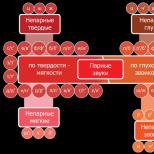In which laboratory to take tests. Where can I take a blood test for free? Choosing a center for laboratory diagnostics. Availability of own laboratory
A biochemical blood test is an important study that allows doctors to study the cellular composition of the blood to detect changes in its parameters, which will help determine the presence of certain diseases. A timely blood test will help the doctor identify the foci of inflammation in the body even before the first symptoms of the disease appear.
Where to do a biochemical blood test in Moscow and how to prepare for it?

Preparation for this procedure is not difficult. Blood is donated on an empty stomach - this is why many specialized laboratories start work at seven in the morning so that patients can take tests before work and have time to have breakfast. It is recommended to exclude fatty, salty, fatty, alcoholic drinks, energy drinks, heavy food, strong coffee and tea 12 hours before donating blood. It is better to avoid powerful physical exertion and severe stress the day before, as these actions can distort the real picture of the tests. Only drinking pure mineral water is allowed.
To conduct a biochemical analysis, the doctor takes blood from a vein - usually located in the bend of the elbow. Before this, the sampling area is treated with alcohol, after which a syringe with a long needle or its more modern variants is used. As a rule, the result of the tests will be ready within a day after the delivery. Some private clinics are ready to offer the result and interpretation of a biochemical blood test in a few hours.
Patients can donate blood for biochemical analysis in many laboratories of the city, as well as in medical centers collected on our portal. Unfortunately, not all clinics are ready to offer this service, so you need to pay special attention to this point when choosing a medical institution.
What does a standard biochemical blood test show?
In the process of diagnosis, the doctor studies many important indicators, on the basis of which pathological deviations in activity are revealed. Among them are the following:
- Blood glucose - allows diagnosing diabetes mellitus and choosing the optimal therapy for further treatment evaluate the effectiveness of already prescribed procedures. Some liver dysfunctions and endocrine diseases lead to a decrease in glucose levels. Normal values depend on the age of the patient.
- Bilirubin is a special yellow blood pigment, formed during the breakdown of hemoglobin, cytochromes and myoglobin. An increase in its amount is characteristic of damage to liver cells, a violation of the outflow of bile and an increased breakdown of red blood cells. Normal values of total bilirubin: 3.4 - 17.1 μmol / l.
- Total protein - the indicator reflects the amount of proteins, the decrease of which is characteristic of some diseases of the kidneys and liver. An increase is present in infectious and inflammatory processes, blood diseases. Normal values of total protein: 66-83 g / l.
- Cholesterol is a dietary blood lipid that is also synthesized by liver cells. Normal performance cholesterol: 3.2-5.6 mmol / l.
- Creatinine - plays an important role in the energy metabolism of tissues. Its presence and concentration in the blood highest value in the diagnosis of renal diseases, as it must be completely excreted by the kidneys. Normal creatinine values: men - 62 - 115 µmol / l; women - 53 - 97 µmol / l.
In the results of biochemical analysis, there are many other points that are of great importance for the doctor and his diagnostics.
* revenue according to RBC
Methodology: RBC rating is based on revenue data medical institutions provided by the companies themselves or published in the financial statements. In the absence of consolidated data, we estimated turnover by summing up revenue legal entities, managing clinics, used the assessments of analysts and market participants.
RBC rating does not take into account the quality of rendering medical services, but we asked insurance companies to evaluate their partners in terms of value for money, reputation in the market, the level of specialists, technical equipment, as well as the loyalty of medical institutions to insurers. Also, insurance companies provided data on the amount of the average check in a particular institution and the average number of policies served per month. When calculating the total score, we did not take into account the assessments of insurance companies, set by their own clinics. The result is the average of the ratings of at least three insurance companies, reduced to a five-point scale.
Due to the obvious conflict of interest, the assessments of insurers cannot be used as an indicator of the quality of medical services in a particular institution, but rather indicate the relationship between insurance and treating companies.
We thank VTB-Insurance, Ingosstrakh, RESO-Garantia, AlfaStrakhovanie, Alliance Insurance Company, Metlife, MAKS Insurance Company and Soglasie for the provided estimates.
Total share
The whole pie that medical companies can claim is quite small. Most of the money is circulating in the compulsory medical insurance system - 700 billion rubles. (2013), but the business has not yet learned how to work with these tools. Compulsory insurance in the structure of income of private companies does not reach 1.5%. There are many reasons for this, but the main one is that entrepreneurs are deprived of access to another major source of healthcare spending - budgetary support for medical institutions.
If the state polyclinic pays for repairs and supplies of equipment from earmarked funds, and the CHI allows doctors to pay, then private offices have to include capital costs in the check. As a result, it becomes almost impossible for them to compete for compulsory medical insurance, even if their operating activities are built more efficiently. Government agencies, on the contrary, can also compete for voluntary insurance. So, the system of clinics of the Office of the President (not included in the rating) - famous brand in the DMS market.
Among medical institutions that are not part of the Ministry of Health, the largest revenue (by a threefold margin) is shown by Russian Railways clinics - hundreds of clinics and hospitals, with a turnover of 28 billion rubles. But it is impossible to call them private either in terms of the form of ownership or the principles of operation: most clinics serve only employees of a state-owned company and do not work on the VHI market. Gazprom and Rosneft also have their own medical units, which are much inferior to Russian Railways.
Among private companies, the first place in the country is occupied by the medical subsidiary of AFK Sistema, MEDSI, with a rather modest turnover of 9 billion rubles. In second place is Invitro; In addition to the leader, the top 25 includes two more laboratory and diagnostic companies — Gemotest Laboratory (No. 12) and Helix Laboratory Service (No. 17). In third place, Mother and Child Clinic is the only public company in the rating (its managing structure, MDMG, is traded on the London Stock Exchange). Behind Last year capitalization of MDMG fell by more than 30%. Another successful participant in the rating (No. 5) is the Medical and Diagnostic Center of the International Institute of Biological Systems. S.I. Berezina (LDC MIBS). Behind this unpronounceable name is a company that has created a market for private magnetic resonance imaging in Russia.
The market is fragmented - the 25 largest companies together do not choose even 17% of total revenue. For comparison, in such a fragmented industry as grocery retail, the 10 largest players cover 20% of the market. The total turnover of the rating participants is 77 billion rubles.
The undisputed leader in terms of revenue per establishment - 3 billion rubles. - became the clinic "Medicine", naturally located in Moscow (a quarter of the market falls on the two capitals). The results of the study show, however, that for further growth, large players need to go to the regions: there are nine companies in the rating with an extensive network (at least in four cities), but six of them are in the top ten. In million-plus cities, it is already possible to build a large medical business right now - two participants in the rating do not go beyond Yekaterinburg (New Hospital) and Nizhny Novgorod (Sadko).
One company in the rating, United Medical Center, operates primarily in the specific market of medical examinations and medical certificates. Those who want to go to the pool, buy a gun or get a license, as well as people who need a medical book, brought the company 1.2 billion in revenue and ensured business growth of 56% in one year; according to this indicator, the Unified Medical Center is the champion of the rating. The European Medical Center and Gemotest laboratories grew by 47% (200 points across the country). But almost all of them are growing - 20 companies of the rating showed double-digit growth rates in 2014, another five just grew, no one reduced revenue.
The situation, however, may change: in 2015, against the background of cost reductions (and staff cuts) by companies, market participants predict a drop in VHI costs: in Moscow, they will remain at the level of 60 billion rubles in 2015-2016. (estimated by "BusinessStat"), and in the regions will be reduced from the current 38 to 16 billion. At the same time, the gray market will grow (up to 30% in 2015). Direct payments, which account for the majority of private healthcare revenues, could also fall.
Catch up with fear
Private clinics operate virtually without state control: the Ministry of Health is not yet able to assess the quality of their work - the first such attempt will be completed only by the end of 2016. Therefore, external supervision of private clinics is carried out only by insurance companies interested in not overpaying in premiums and not losing clients. RBC asked several insurance companies to evaluate their satisfaction with work with rating participants. Insurance companies made their assessments according to their own criteria (price/quality ratio, customer loyalty, equipment and staff quality).
The resulting scores do not determine the position of companies in the ranking and cannot be considered direct correlates of quality. medical work(low scores of insurers predictably received the two most expensive clinics in the ranking), but give an idea of who will qualify for the VHI market, and who will work directly with consumers.
| 4 | , clinical laboratory Moscow, Sokolinaya Gora, Okruzhnoy proezd, 30-A |
| 5 | , clinical diagnostic laboratory Moscow, Meshchansky, Tsvetnoy Boulevard, 26, building 1 |
| 6 | , medical laboratory |
33 reviews
| 8 | , medical laboratory |
| 9 | , medical laboratory Moscow, Chertanovo Yuzhnoye, Kirovogradskaya street, 38, building 1 |
| 10 | , laboratory Moscow region, |
24 reviews
| 12 | , medical genetic center |
| 13 | , genetic expertise Moscow, Moskvorechye-Saburovo, Moskvorechye street, 1, room. No. 116 |
| 15 | , diagnostic center Moscow, Shchukino, Gamalei street, 19, building 1 |
20 reviews
| 17 | Center for Biotic Medicine Moscow, Tagansky, Zemlyanoy Val street, 46 |
| 19 | , clinical diagnostic laboratory |
| 20 | , medical laboratory |
The development of private medicine has allowed people to avoid many of the unpleasant experiences associated with visiting medical institutions. If earlier, in order to pass the necessary analysis, it was necessary to get from a doctor cherished voucher and on the appointed day to appear in the treatment room, spending time in long queues, then with the advent of clinical laboratories in Moscow. But in addition to convenience, the patient seeks to gain confidence in the accuracy of the results. To choose the best private institution, we suggest that you read the reviews on our portal. They will help you learn more about the work of Moscow clinical laboratories and, therefore, make your choice.
Anyone who in one way or another encountered the work of these medical organizations, we ask you to describe your impressions on the ProDoctors portal. These few lines will not take you much time, but they will be very useful for hundreds of site visitors.
Choosing a laboratory in Moscow
More and more more people today they do tests in clinical laboratories in Moscow. This provokes an increase in the number of data from medical institutions. Some of them even have hundreds of branches outside the capital.
Modern clinical laboratories are no longer limited to basic research. Here you can not only donate blood and biomaterials for analysis, but also receive many other services. Specialists conduct cytological, histological, immunological studies, determine the level of certain hormones in the body, conduct allergological tests, etc. Some Moscow clinical laboratories also offer more complex manipulations, such as liver diagnostics without a biopsy. In addition, it is also possible to conduct a study of the dysbiotic state of the mucous membranes.
Innovative technologies allow Moscow laboratories to carry out complex analyses. For example, here you can identify the presence of hereditary diseases even in newly born babies. And of course, research is being done to determine biological motherhood and fatherhood.
Many clinical laboratories in Moscow collect materials even at the patient's home, which can be very convenient when examining elderly people. No less convenient is the system for obtaining results: for this, you just need to go to Personal Area on the institution's website or check your email. Some clinics have gone even further and, in addition to conducting tests, offer to consult with narrow specialists or undergo functional diagnostics. Here you can get a medical book or undergo a preventive examination.





